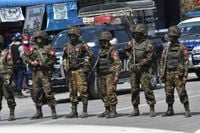In a shocking escalation of tensions, the fragile ceasefire between India and Pakistan was shattered just hours after its announcement, as Pakistan launched a series of drone attacks and artillery shelling across Jammu and Kashmir (J&K), with impacts felt as far as Punjab and Rajasthan. The Indian military responded decisively, targeting key locations within Pakistan, including Islamabad, Rawalpindi, and Lahore, using air-to-surface missiles and drones.
On Friday, May 9, 2025, multiple blasts were reported in Jammu city, with projectiles illuminating the night sky during a blackout. Red streaks were seen and explosions echoed in the Samba sector as India's air defense intercepted Pakistani drones amid the blackout. Jammu and Kashmir Chief Minister Omar Abdullah urged residents to stay indoors, emphasizing the importance of avoiding rumors during this tense period.
As the situation escalated, a precautionary blackout was enforced in several regions, including Akhnoor, Udhampur, Ambala, Panchkula, Firozpur, and Jaisalmer. Reports indicate that the Pakistani army conducted multiple airspace violations, targeting Indian military infrastructure on the night of May 7 and 8, 2025. Among the targets were civilian areas, including a medical center and a school, raising alarms about the safety of non-combatants.
Colonel Sofia Qureshi, during a press briefing, highlighted that Pakistan had been spreading false information on social media regarding the destruction of India's S-400 missile systems, labeling these claims as baseless. Meanwhile, Indian Foreign Secretary Vikram Misri asserted that India had responded to the Pakistani attacks in a responsible manner, emphasizing the need for proportionality in military actions.
On Saturday, May 10, 2025, the Fazilka District Administration directed residents to limit their outings until further notice, urging calm and cooperation. A red alert was issued in Jalandhar, where a missile was intercepted near the Indian Oil Depot. Barmer District Collector Tina Dabi echoed these sentiments, instructing residents to remain indoors amid the heightened alert.
In a significant development, projectile debris was retrieved from Gujarat's Kachchh, indicating the extensive reach of the ongoing conflict. The Press Information Bureau (PIB) confirmed that claims regarding the capture of an Indian female Air Force pilot by Pakistan were false, underscoring the misinformation being propagated during this crisis.
As tensions mounted, reports surfaced of unprovoked firing by Pakistan Rangers on Border Security Force (BSF) posts along the International Border in Jammu late Friday night. The Indian military responded by destroying a terrorist launch pad in Sialkot, Pakistan, that had been used for drone operations against India.
In a broader diplomatic context, U.S. Secretary of State Marco Rubio reached out to Pakistan Army Chief Asim Munir, offering assistance to facilitate talks with India amid the escalating tensions. Meanwhile, the G7 nations urged both countries to exercise maximum restraint and engage in direct dialogue to de-escalate the situation.
Amid the military confrontations, the Indian Premier League (IPL) faced disruptions, with the Board of Control for Cricket in India (BCCI) suspending the tournament due to the ongoing military conflict. This decision reflects the gravity of the situation, as the country focuses on national security.
As of Saturday morning, India had targeted at least four Pakistani airbases, including Nur Khan, Murid, and Rafiqui, marking a significant escalation in military actions. Pakistan subsequently closed its airspace to all traffic in response to India's retaliatory strikes, further complicating the geopolitical landscape.
In J&K, a senior government official was confirmed dead due to Pakistani shelling in Rajouri, highlighting the human cost of the conflict. The Indian military has continued to assert its readiness to defend against any further incursions, maintaining a high alert status across sensitive regions.
As the situation unfolds, the Indian government has taken precautionary measures, including the cancellation of leaves for staff at AIIMS Bhubaneshwar and heightened security alerts across various states. The ongoing conflict has also led to the suspension of classes at universities in Punjab, reinforcing the impact on civilian life.
Locals in border areas have been advised to relocate to safer locations due to the continued shelling from Pakistan. The Indian Navy has issued a warning to fishermen along the Mumbai coastline, enforcing a 'shoot to kill' order in sensitive areas.
In summary, the situation between India and Pakistan remains highly volatile, with military actions escalating rapidly. The international community is closely monitoring developments, urging both nations to seek diplomatic solutions to restore peace and stability in the region.




